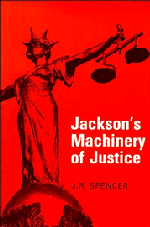Book contents
- Frontmatter
- Contents
- Acknowledgements
- List of figures
- List of tables
- Preface
- Preface to the first edition of ‘The Machinery of Justice in England’
- Abbreviations
- I Historical introduction
- II Civil jurisdiction
- III Tribunals
- IV Criminal jurisdiction
- V The personnel of the law
- VI The European dimension
- VII The cost of the law
- 38 The finances of the law courts
- 39 ‘Costs’
- 40 Legal aid
- 41 Future prospects for legal aid
- VIII Law Reform
- Appendix A The Report of the Civil Justice Review
- Table of Cases cited
- Table of Statutes cited
- Table of Stationery Office publications cited
- Index
40 - Legal aid
Published online by Cambridge University Press: 10 January 2011
- Frontmatter
- Contents
- Acknowledgements
- List of figures
- List of tables
- Preface
- Preface to the first edition of ‘The Machinery of Justice in England’
- Abbreviations
- I Historical introduction
- II Civil jurisdiction
- III Tribunals
- IV Criminal jurisdiction
- V The personnel of the law
- VI The European dimension
- VII The cost of the law
- 38 The finances of the law courts
- 39 ‘Costs’
- 40 Legal aid
- 41 Future prospects for legal aid
- VIII Law Reform
- Appendix A The Report of the Civil Justice Review
- Table of Cases cited
- Table of Statutes cited
- Table of Stationery Office publications cited
- Index
Summary
It is obvious that a large section of the community cannot possibly afford the costs that have been mentioned in the preceding section, any more than they could afford to pay for private schooling or medical treatment. An extensive system of legal aid and advice is therefore made available to help them. At the time of writing this system is in a state of flux: a Government White Paper in March 1987 was followed by a Legal Aid Bill which was introduced in December 1987, and which is before Parliament at the time of writing. A section at the end of this chapter attempts to predict the future pattern.
At present there are four distinct systems of legal aid to contend with:
(1) Legal advice and assistance (generally known as the ‘Green Form Scheme’), and its off-shoot ‘assistance by way of representation’ (generally known as ‘ABWOR’);
(2) legal aid for civil proceedings;
(3) legal aid for criminal proceedings; and
(4) advice and representation provided by a duty solicitor at a magistrates' court or police station under the Legal Aid (Duty Solicitor) Scheme 1985.
The statutory basis for all of these is two Acts of Parliament – the Legal Aid Act 1974 and the Legal Aid Act 1982 – and a mass of Statutory Instruments made by the Lord Chancellor under powers which those Acts confer on him.
- Type
- Chapter
- Information
- Jackson's Machinery of Justice , pp. 463 - 481Publisher: Cambridge University PressPrint publication year: 1989

